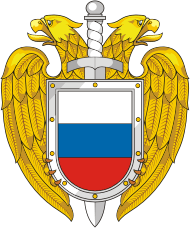 Another of the heirs of the FAPSI is the FSO (Federal’naya Sluzhba Okhrani), identified in [1] as military unit 32152 and headed since May of this year by Major General Dmitry Kochnev (his predecessor, Evgeny Murov, was General of the Army, two ranks higher, and this in the Russian services is very important). Murov obtained very important FAPSI attributions: with more than 20,000 troops today (supposedly, since it is classified information, and various sources speak of more than 50,000), the FSO inherited and expanded the KGB’s Ninth Address, with responsibility for the protection of governmental “goods”, in the broadest sense of the word. For example, the Presidential Security Service, the PBS-Putin’s bodyguards, or control of the famous Russian nuclear briefcase depend on the FSO, as well as the operation of a secure network for the transmission of election results, GAS Vybory (Information is, obviously, an asset to be protected). Specifically, from a cyber point of view, this service has assumed, among other capacities, those associated with strategic SIGINT, the guarantee of exploitation of state systems – especially regarding its protection against foreign services – and the security of National classified information ([2]), which includes presidential communications: the FSO provides secure communications at a very high level, for example between the Kremlin and the main Russian military commanders, giving it enormous control power for the control of information …
Another of the heirs of the FAPSI is the FSO (Federal’naya Sluzhba Okhrani), identified in [1] as military unit 32152 and headed since May of this year by Major General Dmitry Kochnev (his predecessor, Evgeny Murov, was General of the Army, two ranks higher, and this in the Russian services is very important). Murov obtained very important FAPSI attributions: with more than 20,000 troops today (supposedly, since it is classified information, and various sources speak of more than 50,000), the FSO inherited and expanded the KGB’s Ninth Address, with responsibility for the protection of governmental “goods”, in the broadest sense of the word. For example, the Presidential Security Service, the PBS-Putin’s bodyguards, or control of the famous Russian nuclear briefcase depend on the FSO, as well as the operation of a secure network for the transmission of election results, GAS Vybory (Information is, obviously, an asset to be protected). Specifically, from a cyber point of view, this service has assumed, among other capacities, those associated with strategic SIGINT, the guarantee of exploitation of state systems – especially regarding its protection against foreign services – and the security of National classified information ([2]), which includes presidential communications: the FSO provides secure communications at a very high level, for example between the Kremlin and the main Russian military commanders, giving it enormous control power for the control of information …
The Spetssvyaz is framed within the FSO since 2004 (previously belonging to the FSB), the Special Information and Communications Service (SSSI), which is currently considered by some analysts to be the Russian equivalent of the US NSA (Although the intelligence community of both countries are different and therefore the NSA allocations are spread among Russian agencies). This group develops the above-mentioned cyber powers of the Service and includes at least one Directorate for the management of civilian government communications, another for the management of military government communications, a General Directorate for information resources (apparently dedicated to the protection of information in itself, in its broadest sense) and another Directorate-General for Information Systems ([3]), dedicated to the protection of systems dealing with data. The Director of Spetssvyaz, Alexey Mironov, is also Deputy Director of the FSO, a young General, who was to replace Evgeny Murov at the helm of the service after his retirement … until GD Kochnev was appointed for that post; an unexpected action for many and of course unusual, especially because of Kochnev’s engagement …
A curiosity: the FSO ordered in 2013 the purchase of typewriters (yes, typewriters, good old-fashioned ones) after some scandals of data theft – assumptions – by third parties, to avoid leakage of information. Another curiosity: Spetssvyaz records Internet domains in an open way: kremlin.ru, gov.ru, ру.рф, da-medvedev.ru … Although we are attracted by the fact (not only by the fact itself, but also by some of the Registered domains) they are not the only ones that do it: services closer to us follow or have followed the same open philosophy … at least in some cases. We will speak in some registry post of certain “curious” domains, near and far from here :)
References
[1] Jeffrey Car. Inside Cyber Warfare: Mapping the Cyber Underworld. 2nd Edition. O’Reilly, 2011.
[2] President of the Russian Federation. Strategy for the national security of the Russian Federation up to 2020. Mayo, 2009.
[3] Jonathan Littell. The Security Organs of the Russian Federation. A brief history 1991-2005. Post-Soviet Armies Newsletter. Psan Publishing House, 2006.
